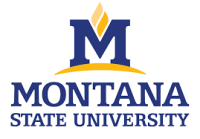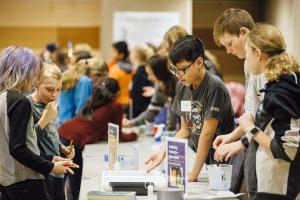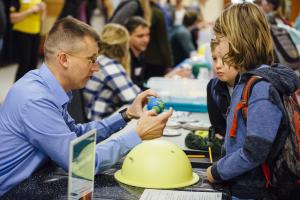What started as a six-station gathering in the lobby of a Montana State University academic building has grown into a university-wide event that fills the student union ballrooms and reaches more than 500 members of the community.
Montana’s first NanoDays launched in 2008 as a partnership between MSU Extended University, Montana NSF EPSCoR and MSU’s Center for Bio-Inspired Nanomaterials (CBIN). In 2015, the event was renamed NanoDays/MicroDays to accommodate the many small-but-not-quite-nano scientists and engineers who wanted to participate. Demand grew further still, and in 2018, the event was re-christened MSU Family Science Night (featuring NanoLand) to host all the university faculty and students who wanted to take part. This year’s event was held March 1.
In addition to NanoDays activity classics such as Gummy Capsules, and Invisibility, this year’s event featured activities from the Explore Science: Earth & Space Toolkit like Filtered Light and Magnetic Fields. MSU Family Science Night also showcased other projects such as NASA’s Aerokats and Rovers Education Network (AREN), which built miniature kites and WAFERx – an NSF-funded effort on the water-energy-food nexus, which featured an algae biofertilization demonstration. Also featured was “Bobcat Birthday Science” to celebrate MSU’s 125th birthday.
Dr. Wataru Nakagawa of MSU’s Electrical and Computer Engineering Department has participated in NanoDays since 2010 and estimates more than 40 students from his lab have honed their nano communications skills in “NanoLand” by donning clean suits, demonstrating Nano Gold and helping kids crawl through a scale model of a human hair.
The 2018 Family Science Night event reached 150 fifth-graders from local Title 1 schools (high percentage of free and reduced lunch) and 385 members of the community. An additional 50 MSU students, staff and faculty volunteered, including many pre-service teachers from MSU’s College of Education.
Family Science Night is hosted by MSU Academic Technology and Outreach. For more information, visit http://ato.montana.edu/familyscience.
Read more about how MSU researchers are using nanoscale science to unravel the mysteries of the brain and explore new ways to treat diseases like Alzheimer's.



